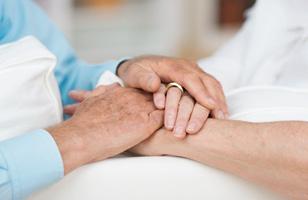
5 minute read
What happens after my treatment has finished?
Follow-up appointments
You will be able to discuss any concerns you have at your follow-up appointments
Advertisement
After your treatment has finished, your doctor will arrange follow-up appointments. During these appointments, you will typically have a clinical examination, including an examination of the pelvic and rectal area. Some patients might also have a CT or PET/CT scan – your doctor will discuss this with you. Your doctor will let you know how often you need to return for further follow-up appointments, but a typical follow-up schedule would involve check-ups every 3–6 months in the first 2 years after treatment, every 6–12 months after 3 years and annually after 5 years (Marth et al. 2017).
What if I need more treatment?
Despite the best possible treatment at diagnosis, there is still a possibility that your cancer may return. Cancer that comes back is called a recurrence. The treatment that you will be offered depends on the extent of the recurrence. When the tumour comes back as a recurrence at a single site in the pelvis following primary surgery, you may be offered radiotherapy or pelvic exenteration (removal of the bladder, part of the bowel, ovaries, uterus, cervix and vagina). Recurrent tumours in distant organs are regarded as metastatic cancers and you may be offered chemotherapy and targeted therapy (see section ‘What are the treatment options for metastatic cervical cancer?’ for more information).
Looking after your health
After you have had treatment for cervical cancer, you may feel very tired and emotional. Give your body time to recover and make sure you get enough rest, but there is no reason to limit activities if you are feeling well. It is important to take good care of yourself and get the support that you need.
• Take plenty of rest when you need it: Give your body time to recover. Complementary therapies, such as aromatherapy, may help you relax and cope better with side effects. Your hospital may offer complementary therapy; ask your doctor for details. • Eat well and keep active: Eating a healthy diet and keeping active can help improve your fitness. It is important to start slowly, with gentle walking, and build up as you start to feel better. The following eight recommendations form a good foundation for a healthy lifestyle after cancer (Wolin et al. 2013):
Don’t smoke Avoid second-hand smoke Exercise regularly Avoid weight gain Eat a healthy diet Drink alcohol in moderation (if at all) Stay connected with friends, family and other cancer survivors Attend regular check-ups and screening tests

A healthy, active lifestyle will help you to recover physically and mentally
Regular exercise is an important part of a healthy lifestyle, helping you to keep physically fit and avoid weight gain. In cancer survivors, exercising regularly (e.g. 30 minutes five times a week) can improve physical function, fitness, strength, cancer-related fatigue, depression and quality of life (Lin et al. 2016). It is estimated that only a third of cervical cancer survivors are getting enough exercise (Pennington and McTiernan 2018), so it is very important that you listen carefully to the recommendations of your doctor or nurse, and talk to them about any difficulties you have with exercise.
Long-term effects
After completing treatment for cervical cancer, you may experience some long-term side effects, depending on the treatment you have received.
Pelvic radiotherapy can cause scarring in the lining of the large bowel and weakening of rectal muscles, resulting in long-term bowel symptoms such as diarrhoea, constipation, incontinence or bleeding from the rectum. Radiotherapy can also cause long-term effects on the urinary tract (Liberman et al. 2014), as well as lymphoedema up to 1–2 years after treatment, and body image and sexual problems as long as 5 years after treatment (Dieperink et al. 2018). Permanent skin changes, difficulty with bowel and bladder control, chronic pain and hot flushes are all common long-term effects of radiotherapy, which can also result in women feeling less feminine and dissatisfied with their bodies. Permanent tattoos in the vulval area, which are drawn onto the skin to ensure the radiotherapy is directed to the correct area, may also affect body image. Tightening and shortening of the vagina due to scarring from radiotherapy, combined with vaginal dryness, pain and bleeding during or after sex, may also lead to a lack of sexual desire long after radiotherapy treatment is complete (Khalil et al. 2015).
Radical surgery to remove the tumour may mean that the bowel and/or bladder are damaged, and a permanent stoma (a small opening on the surface of the abdomen to direct faeces and/or urine into an external stoma bag) may be necessary (Hsu et al. 2012). Having a hysterectomy can increase the risk of urinary incontinence and vaginal prolapse years after surgery due to damage to the supporting pelvic floor muscles. If the ovaries are removed, menopause will be triggered in women who have not already experienced it.
As well as physical effects, psychosocial problems such as mood and stress disorders, body image anxiety and fear of recurrence may affect you long after your treatment has ended (Pfaendler et al. 2015). You may be unsure if you are able to endure the stress of returning to work, but this can provide an opportunity to reconnect with colleagues and is a source of self-worth and purpose for many people. You may also be concerned about loss of fertility or your ability to maintain a pregnancy; however, there may be alternative options if you are no longer able to conceive naturally, including assisted reproduction techniques.
The long-term effects of cervical cancer and its treatment can be managed so it is important that you tell your doctor or nurse about any persistent or new symptoms. Your doctor or nurse will also work with you to develop a personalised survivorship care plan.
For further information and advice regarding how to regain your life as far as possible after treatment for cancer, see ESMO’s patient guide on survivorship (http://www.esmo.org/Patients/Patient-Guides/Patient-Guide-on-Survivorship).
Survivorship
What does survivorship mean?
Let us explain it to you.
esmo.org ESMO Patient Guide Series
based on the ESMO Clinical Practice Guidelines In collaboration with
Emotional support
It is common to be overwhelmed by your feelings when you have been diagnosed with cancer and when you have been through treatment. If you feel anxious or depressed, talk to your doctor or nurse – they can refer you to a specialist counsellor or psychologist who has experience of dealing with emotional problems of people dealing with cancer. It may also help to join a support group so that you can talk to other people who understand exactly what you are going through.










